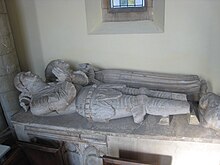Walter Fitzwalter, 7th Baron Fitzwalter
Walter Fitzwalter, 7th Baron Fitzwalter (according to other counting 5th Baron Fitzwalter ) (* 1400 ; † November 23, 1431 ) was an English nobleman and military.
origin
Walter Fitzwalter came from the noble Fitzwalter family . He was the second son of Walter Fitzwalter, 5th Baron Fitzwalter and his wife Joan Devereux . His father died in Italy in 1406 after he was captured by Saracen pirates and only released after paying a ransom. His mother then married Hugh Burnell, 2nd Baron Burnell , but died in 1409.
Life
Presumably, after the death of his parents, Walter grew up with his father's stepmother, Philippa Mohun, Duchess of York, whose husband Edward of Norwich had challenged his father to a duel in vain. After the death of his older brother Humphrey, who died in 1415 at the age of 16, Walter became the heir of his father's estates. Fitzwalter probably came to the royal court through his father's stepmother. There he impressed King Henry V so much that the latter beat him to a Knight Bachelor degree in 1420 and appointed him overseer of his hunting dogs. In the same year he took part in the king's campaign in Normandy and the siege of Melun during the Hundred Years War . On March 22, 1421, however, he was captured by the French at the Battle of Baugé . After paying a large ransom, he was released in 1423 and could now take over his inheritance, which was still extensive for him and his father despite the wittum of his father's stepmother and the burdens of the ransom money. In order to enforce the claims of Humphrey, Duke of Gloucester to parts of the Netherlands, which he had through his marriage to Jakobäa von Straubing-Holland , Fitzwalter led an English army to the Netherlands at the end of 1425. In January 1426 he was decisively defeated in the Battle of Brouwershaven by Burgundian troops under Philip the Good and had to flee. 1429 and 1430 he took over as Baron Fitzwalter to the parliaments in part, before he again took part in an expedition to France as commander of the 1431st There he died under no longer known circumstances. His body was brought back to England and, according to his last will, was buried in the Little Dunmow Priory Family Foundation .
Family and offspring
Fitzwalter had married the widowed Elizabeth († 1464), the widow of William Massy and daughter of Sir John Chideock from Dorset , although she was neither nobility nor wealthy. Since his sons from this marriage had already died as children, his daughter Elizabeth became his heir. He also had two illegitimate daughters, Mary and Gabriella, whose financial security he stipulated in his will. Fitzwalter's widow, Elizabeth, married Sir Thomas Cobham of Sterborough , Surrey , after his death . After her death she was buried next to Fitzwalter in Little Dunmow Priory, where the funerary monument of her and Fitzwalter has been preserved.
Web links
- Christopher Starr: Walter Fitzwalter, fifth Baron Fitzwalter (1400–1431). In: Henry Colin Gray Matthew, Brian Harrison (Eds.): Oxford Dictionary of National Biography , from the earliest times to the year 2000 (ODNB). Oxford University Press, Oxford 2004, ISBN 0-19-861411-X , ( oxforddnb.com license required ), as of 2004
- Walter FitzWalter, 7th Lord FitzWalter on thepeerage.com , accessed August 30, 2016.
- FitzWalter, Baron (E, 1295). Cracroft's Peerage
Individual evidence
- ^ Richard Vaughan: Philip the Good. The apogee of Burgundy . Boydell, Woodbridge 2002. ISBN 0-85115-917-6 , pp. 42-43
| predecessor | Office | successor |
|---|---|---|
| Humphrey Fitzwalter |
Baron FitzWalter 1415-1431 |
Elizabeth Fitzwalter |
| personal data | |
|---|---|
| SURNAME | Fitzwalter, Walter, 7th Baron Fitzwalter |
| ALTERNATIVE NAMES | Fitzwalter, Walter, 5th Baron Fitzwalter |
| BRIEF DESCRIPTION | English nobleman and military |
| DATE OF BIRTH | 1400 |
| DATE OF DEATH | November 23, 1431 |
